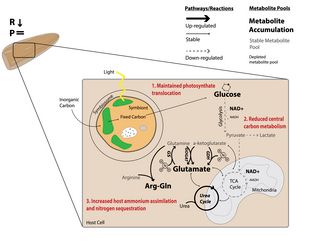


How do corals fuel early development? We tracked physiological and -omic 🧬 changes across #coral 🪸 development. We found that symbiotic interactions are contribute to nutritional demands and shape metabolic response in early life stages.
Read the paper 👉 doi.org/10.1016/j.cu...

How do corals fuel early development? We tracked physiological and -omic 🧬 changes across #coral 🪸 development. We found that symbiotic interactions are contribute to nutritional demands and shape metabolic response in early life stages.
Read the paper 👉 doi.org/10.1016/j.cu...



We found that symbiotic coral larvae reduce their metabolism and increase nitrogen sequestration to resist #bleaching under high temperatures.
Check it out here! plos.io/4foh6lL

We found that symbiotic coral larvae reduce their metabolism and increase nitrogen sequestration to resist #bleaching under high temperatures.
Check it out here! plos.io/4foh6lL

